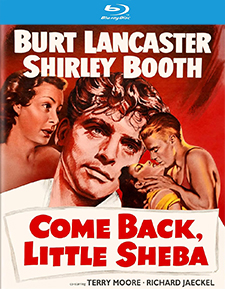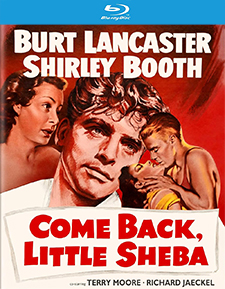Come Back, Little Sheba (Blu-ray Review)

Director
Daniel MannRelease Date(s)
1952 (July 9, 2024)Studio(s)
Wallis-Hazen Productions/Paramount Pictures (Kino Lorber Studio Classics)- Film/Program Grade: A-
- Video Grade: A
- Audio Grade: A
- Extras Grade: B-
Review
Come Back, Little Sheba (1952), a film of William Inge’s 1950 Broadway play, is one of those award-winning, acclaimed and commercially successful pictures that hasn’t aged as well as other such movies. It’s a commendable work overall, despite Burt Lancaster being wildly miscast, though what was fairly innovative by Hollywood standards then isn’t particularly unusual now. The core aspects of its human drama still hold up fairly well, however.
Lola Delaney (Shirley Booth) is a disheveled, overweight, slovenly housewife, married to recovering alcoholic Doc (Lancaster), whom she often calls “Daddy.” He’s been sober for a year, but his past drinking ruined his chiropracting business. She’s garrulous and doting to the point of being irritating, though Doc rarely complains; like a ghost he mostly shambles about their modest home.
Lola advertises for a student border, they living so close to campus. (Location scenes were filmed near USC, south of downtown Los Angeles.) She ends up renting a spare room to Marie (Terry Moore). She’s nearly engaged to a man named Bruce, living in another city, but has a flirtatious relationship with Turk (Richard Jaeckel), a javelin thrower on the make. Kind but prudish Doc, concerned for Marie’s welfare, doesn’t like Turk coming into his house, disrupting things, while Marie’s burgeoning sexuality and youthfulness serves to remind both Lola and Doc of their unhappy middle-aged existence, a lifetime of lost opportunities. We learn that Doc felt obliged to marry Lola after she became pregnant and her father threw her out of the house, only to have the baby die soon after. The title of story refers to Lola’s dog, who vanished without a trace months before, whom Lola still looks for and dreams about.
After debuting at the Westport Country Playhouse, the play of Come Back, Little Sheba moved to Broadway, directed by Daniel Mann, with Booth playing Lola and Sidney Blackmer as Doc. Both Booth and Blackmer won Tony Awards for their performances. Mann and Booth made their film debuts with the film version.
Casting Burt Lancaster as Doc was an obvious effort to “balance the ticket.” Hollywood in its classical period was loathe to cast anyone, particularly women, that weren’t glamorous movie stars in leading roles, so the idea of building a picture around overweight middle-aged Booth, with her uncombed hair and lack of makeup was highly unusual, at least then. Lancaster was box-office insurance, but also 15 years younger than Booth, nearly young enough to be his son, and a very athletic 38—this was made the same year as Lancaster’s rollicking The Crimson Pirate, after all. For the film, they’ve grayed Lancaster’s temples, given him frumpy, padded clothes, etc., but the illusion is never convincing, though Lancaster’s performance is fairly good. I couldn’t help but be reminded again and again how much better scenes would’ve played with Sidney Blackmer in the part.
I suspect that the film was produced at all was probably due to the critical and commercial success of A Streetcar Named Desire the year before (an $8 million gross against a $1.8 million budget). Come Back, Little Sheba’s poster art and trailer hint at this, emphasizing Lancaster over Booth, making her look younger in the posters, positioning Moore and Jaeckel like Brando and Vivien Leigh/Kim Hunter in the ads, etc.
The play and film have dated in various, sometimes surprising ways. Doc resents Lola’s laziness as a housewife, not fixing him breakfast, etc., a very ‘50s attitude toward gender roles, but more intriguing is the idea that Lola is supposed to be a big fat slob who can’t even clean house, yet she’s positively svelte and well-groomed compared to the average Wal-Mart customer today and her supposedly messy home is practically spotless by modern standards.
The film’s best qualities, its core humanism and everyman characters, helped paved the way for Marty-type dramas and less glamorized leading men and women in leading roles, and certain aspects of the story still resonate fairly well. A good scene not in the play and added for the film has Lola accompanying Doc to an AA meeting, where he accepts a birthday cake in honor of the anniversary of his sobriety, Doc both proud and a little embarrassed at once. When he inevitably falls off the wagon, her concern for her husband when Doc and a whiskey bottle kept in a kitchen cabinet disappear escalates into a kind of believable repressed panic as she contacts his AA friends for help. A passive-aggressive next-door neighbor (Lisa Golm), scolding Lola for her slovenliness, is a bit like a proto-“Karen,” backhandedly complimenting her after she cleans house when Bruce comes to visit.
Booth won the Best Actress Academy Award against fairly weak competition that year, and Terry Moore was nominated for Best Supporting Actress in arguably her best film role.
Presented in its original black-and-white, 1.37:1 standard aspect ratio, Kino’s Blu-ray sources a splendid 4K master from 2021 created by Paramount. The image is strong throughout with deep blacks and good contrast. The DTS-HD Master Audio (2.0 mono) is also good, with optional English subtitles provided on this Region “A” encoded disc.
The only extras are an audio commentary track by film historian Scott Harrison, repurposed from an earlier release by Australia’s Imprint label; and the aforementioned trailer, which tries to sell it as a hot-and-steamy variation of Streetcar.
In the end, Come Back, Little Sheba is more like watching a pretty good Playhouse 90 episode than a glossy Hollywood drama. It’s not bad for what it is, but decades of similar pictures on big and little screens have taken the edge of what, then, was edgy and unusual. Recommended.
- Stuart Galbraith IV

